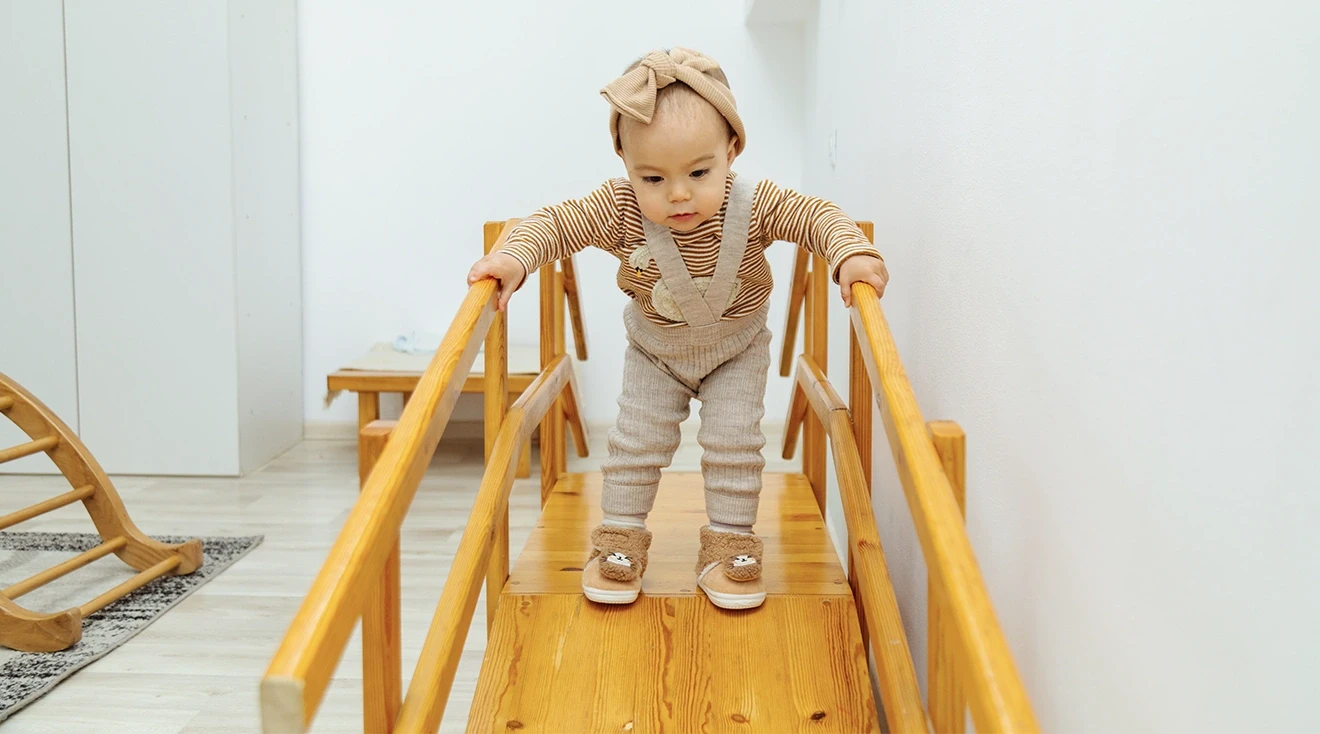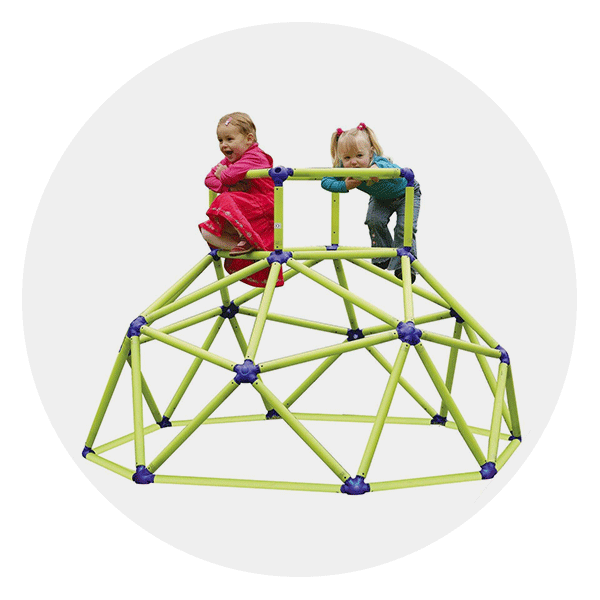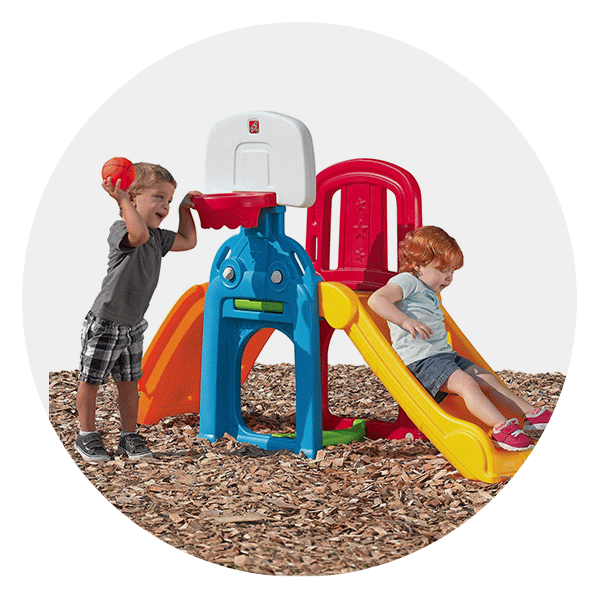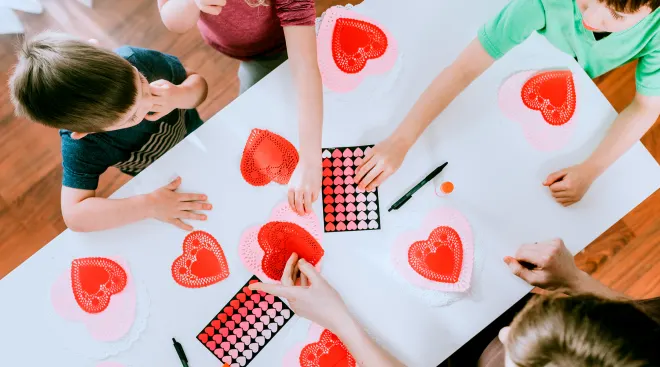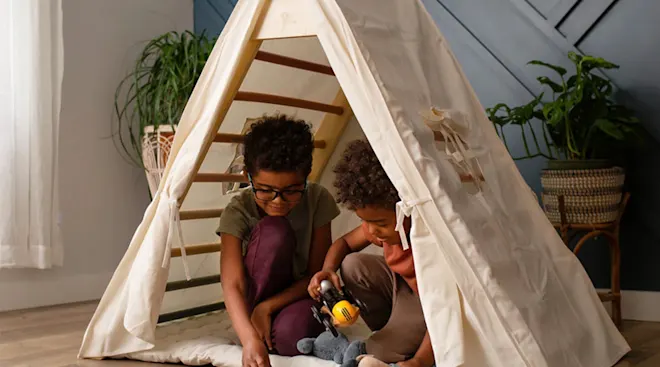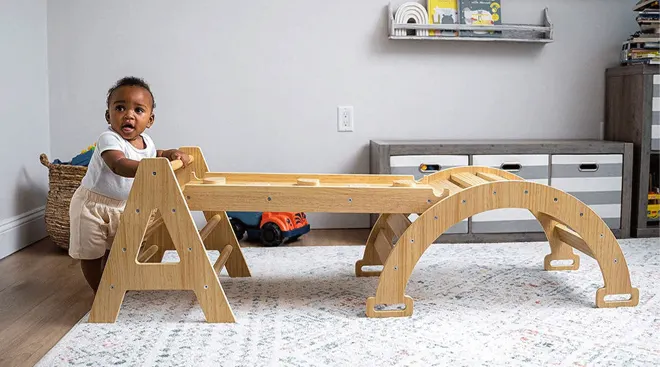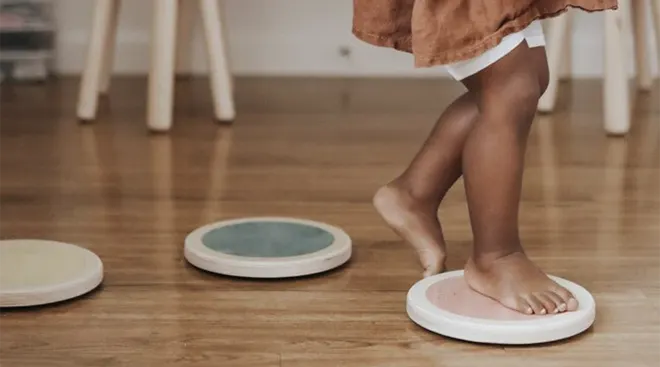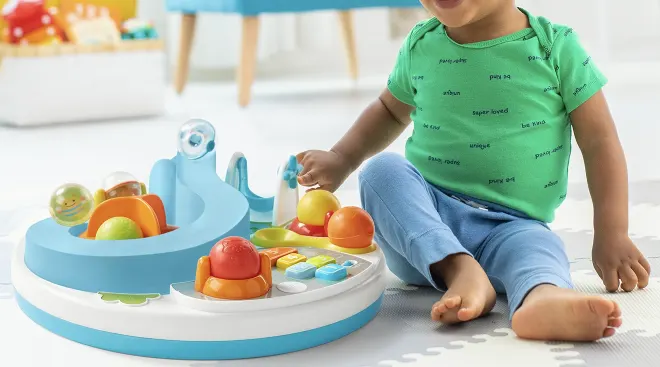8 Best Toddler Climbing Toys for Indoor and Outdoor Play
One thing’s for sure: Tots have no shortage of energy. Thankfully, toddler climbing toys can help busy bees burn some of it off while also helping them work toward developmental milestones. According to Jana Sarno, BCBA, a board-certified behavior analyst and the chief clinical officer of Hopebridge Autism Therapy Centers, “climbing toys can provide a variety of benefits for growing babies and toddlers, including both fine and gross motor skills.” As an example, she explains, “a climbing toy may give your baby the opportunity to work on early gross motor skills such as sitting up, sitting up unassisted and pulling themselves to stand.”
Climbing toys for toddlers come in all shapes and sizes, so there are plenty of options to consider as you shop for your family. While many can be used indoors or outdoors, you might want to consider adding a small-scale toddler indoor climbing toy to your home—especially if you want to keep your tot from scaling the furniture. To streamline your search, check out our favorite designs below. Plus, read expert-backed advice on developmental benefits, safety tips and more.
For more climbing toys, check out our articles on pikler triangles and nugget couch dupes.
We put in the research to help you find the best toddler climbing toys to take your little one’s play session to the next level. This way, you don’t have to spend hours scrolling online. Here are the steps we took to create this article:
-
We interviewed a behavior analyst, a pediatric occupational therapist and a pediatrician to learn what features to look for in toddler climbing toys. Plus, they offered advice on how to safely use these play structures.
-
We put our staff to work, asking them to evaluate the toddler climbing toys they’ve personally used with their families.
-
We researched what was being said about toddler climbing toys in The Bump community forums to learn what parents liked and disliked about specific brands and styles.
-
We consulted safety advice from the American Academy of Pediatrics (AAP) to understand how to keep toddlers safe while they climb and play.
-
Because everyone’s experience is different, we scoured forums and message boards and read user reviews to find out how these climbing toys for toddlers performed for families nationwide.
Editorial integrity is at the heart of everything we publish. Read about how The Bump develops and reviews all articles, including product reviews.
Overall best toddler climbing toy
- Transitional design
- Great for siblings
- Highly durable
- Soft, cushioned material
- Mixed reviews about the toy’s size
According to Abby Hamilton, a pediatric occupational therapist at Hopebridge Autism Therapy Centers, foam climbing blocks for toddlers present a different type of challenge compared to other climbers. “As the foam bends under a child’s weight, children need to learn how to weight shift and balance while climbing,” she explains. As a result, toddler climbing toys made out of foam—just like this one from Best Choice Products—can be used by kiddos of all ages to promote gross skill development. Kathy S., a mom of 3-year-old twins, has used this playset in her home for three years and wholeheartedly agrees. “Pushing the blocks around with no express purpose was great fun for them at first, and then climbing and pushing them together came later and definitely helped with balance and eventually walking,” she shared.
With this set of toddler climbing foam blocks, you’ll receive five fun shapes that can be stacked and arranged to your kiddo’s liking. Each lightweight foam block is made from soft, ASTM-certified foam and has an easy-to-clean vinyl surface. Moreover, Kathy highly praises this toddler climbing toy’s durability. “This set has stood up to rough play wonderfully. Its foam and the covering is tough but not rough. [My twins] have scratched it, bit it, stabbed it with toys, etc., and there isn't a single tear or seam ripping after almost 3 years of having the set,” she told us.
If that’s not all, the colorful shapes also lend themselves well to active, creative playtimes, whether you have a newly minted one-year-old or a preschooler at home. Hamilton suggests: “Use them to provide some support for kiddos learning how to sit upright or build a complex obstacle course for your older kids who have advanced balance and coordination skills.” Kathy is especially impressed by how much her twins love playing on this set together. “From early on they loved to push the pieces together and crawl (and eventually run) over them like an obstacle course,” she shared. “It’s so cute to watch one of them walk along the row of blocks while the other holds their hand and helps them balance!” The bottom line: This indoor climbing toy for toddlers is sure to be a hit in your household for years to come.
Dimensions: 8.5" (L) x 8.5" (W) x 16.3" (H) (small rectangle); 24" (L) x 16.3" (W) x 8.5" (H) (triangle); 16.3" (L) x 16.3" (W) x 8.5" (H) (large rectangle); 8" (L) x 17" (H) (cylinder); 16.3" (L) x 16.3" (W) x 8.3" (H) | Product weight: 15 lbs. | Weight capacity: N/A | Age rating: 1+ years
Our community says:
Our kids turn 4 in January, and this is still a staple in our living room. Whether it's to help build blanket forts or create an obstacle course when the weather keeps us inside, I don't see us getting rid of the set anytime soon! – Kathy S., mom of twins
Best outdoor toddler climbing toy
- Lightweight yet sturdy design
- Great for siblings
- UV- and rust-resistant material
- Not suitable for young toddlers
- Assembly required
Next up on our list of the best toddler climbing toys is this classic jungle gym. A great option for fun-loving tots, the outdoor playset is ideal for hours of energetic and imaginative play. Kids can use it as a base for seated play or climb up the dome and practice hanging from the built-in monkey bars. Catherine M., mom of three, told us that she’s had this playset for almost four years and it’s still a hit with her little ones. “They've used it to climb and get comfortable reaching and jumping but also turned it into imaginative play as a hideout,” she shared. Moreover, it’s made of lightweight plastic with UV protection that connects securely with double self-locking springs. As a result, you’ll get a safe, secure tower that can endure all four seasons.
Dimensions: 70" (L) x 66" (W) x 47" (H) | Product weight: 22 lbs. | Weight capacity: 150 lbs. | Age rating: 3 to 8 years
Our community says:
We got the Eezy Peezy Monkey Bars Climbing Tower when my second was born 3.5 years ago, and it still gets used all the time by both kids (and all their friends when they come over to play!)– Catherine M., mom of three
Best climbing toy activity center
- Multipurpose design
- Several built-in activities
- Suitable for indoor and outdoor use
- Assembly required
Looking for a toddler climbing toy for beginners? Check out this activity center from Step2. Designed for ages two and up, this toddler climber has it all. Your little ones can use the easy-climb stairs to reach the main platform, building their strength as they do so. Then, when they’re up at the top, they can go down the slide, a feature which Sarno appreciates. “Toddler slides give kids the chance to try out different climbing methods and gross motor skills,” she explains. Back down on the ground, your toddler can crawl through the tunnel or score a slam dunk on the basketball hoop. Sarno is a fan of multipurpose toddler climbing toys like this one. “Small yet versatile activity structures like this can keep [kids] entertained while developing their coordination,” she told us. If that’s not all, this playset is sturdy enough for outdoor use but compact enough for indoor use if you have the space. Talk about versatility!
Dimensions: 62" (L) x 30.5" (W) x 42.5" (H) | Product weight: 24.5 lbs. | Weight capacity: 60 lbs. | Age rating: 2 to 6 years
Best arched toddler climbing toys
- Great for creative play, according to parents
- Highly transitional design
- High price point
Concerned about tumbles and scrapes? This foam block set guarantees a soft landing for curious tots. Designed for safety, this toddler climbing toy has no hard surfaces or sharp corners, making it the perfect addition to a playroom. The playset comes with three earth-toned arches that can be stacked together into a rainbow shape, used upside-down as seesawing seats or arranged to create a dynamic obstacle course. No matter how your toddler chooses to use them, the aesthetically pleasing design won’t look out of place in your living space. Plus, you’ll appreciate that each piece is made from vegan leather that’s easy to keep clean; if they get grubby, simply wipe them down with a damp cloth, and you’re good to go. This climbing toy for toddlers gives little ones the freedom to build, crawl, climb and create to their hearts’ content. What more could you ask for?
Dimensions: 22" (L) x 17" (W) x 42" (H) | Product weight: N/A | Weight capacity: 45 lbs. | Age rating: 9 months to 5 years
Best balance beam for toddlers
- Easy to store
- Has anti-slip pads
- Suitable for indoor and outdoor use
- Store inside overnight
Keep things simple with a balance beam by Lily and River. The Montessori-inspired toy is designed to help your mini gymnast with balance, coordination and confidence. And thanks to the furniture-grade anti-slip pads, you can ensure it’ll stay in place as your little one plays. Each beam is hand-built from premium birch hardwood, so you can count on it to stand the test of time. What’s more, the high weight capacity means it’s ideal for siblings to use together or during at-home playdates. Use it on its own or alongside other toddler climbing toys, inside or out. Either way, this versatile climber is sure to leave your kiddo beaming with joy.
Dimensions: 48" (L) x 4" (W) x 6" (H) | Product weight: | Weight capacity: 100 lbs. | Age rating: 18 months to 8 years
Best toddler balance board
- Multipurpose design
- Felted base
- Small footprint
- Using a balance board may take some practice
- Not suitable for young toddlers
This innovative wooden toy functions as just about anything your littles dream up: a ramp, a bridge, a rocker—the options are endless. While it isn’t a traditional climbing toy for toddlers, it offers many of the same great benefits. And with a weight capacity of up to 300 pounds, big kids (and even adults!) can join in the fun too. Better yet, this versatile board is made from natural materials and has a felt lining on the base so it won’t leave scuff marks on your floor.
Dimensions: 41.9" (L) x 15.3" (W) x 15" (H) | Product weight: 9.9 lbs. | Weight capacity: 300 lbs. | Age rating: 3+ years
Best rock wall for toddlers
- Doubles as a playhouse
- Suitable for indoor and outdoor use
- Assembly required
- Heavy
Rock walls are a great way to refine those hand-eye coordination skills, as kids have to navigate the hand- and foot-holds as they pull themselves up. That being said, a full-size rock wall may be too much for your tot to handle, which is why we like this mini version by KidKraft. This wooden A-frame clubhouse has a window on one side and a climbing wall with six rocks on the other. Newly minted tots can use it as a cozy clubhouse, while older kids can practice their climbing skills. Once your little one makes it to the tip-top, they can ring a bell on the roof to announce their success.
Dimensions: 42.5" (L) x 31.3" (W) x 36.6" (H) | Product weight: 35.3 lbs. | Weight capacity: N/A | Age rating: 3 to 5 years
Best stepping stones for toddlers
- Stackable for storage
- Anti-skid bottoms
- Suitable for indoor and outdoor use
- Must be stored inside
Not all toddler climbing toys need to be high! Case in point: These stepping stones. While they may be just a few inches off the ground, they still provide a perfect opportunity for tots to hone their gross motor skills. This classic set is a fantastic addition to your playspace. Six “stones” feature different heights, which helps kids learn about spatial relationships and balance. Your little ones can use the steps as part of an obstacle course or for popular preschool games like Mother, May I and Floor is Lava. The stones have a non-slip surface and rubber edges, so they won’t slip and slide during playtime.
Dimensions: 14" (L) x 14" (W) x 3" (H) (big stones); 10" (L) x 10" (W) x 2" (H) (small stones)| Product weight: 2.2 lbs. | Weight capacity: 110 lbs. | Age rating: 3 to 7 years
Toddler climbing toys can play an important role in promoting your little one’s physical, emotional and social development. The AAP stresses the importance of this type of play as “physical fun helps develop children’s motor skills, prevent childhood obesity and build emotional intelligence.” Alexis Phillips-Walker, DO, is a pediatrician at Memorial Hermann Medical Group Pediatrics in Atascocita, Texas, adds that “climbing is a great way for toddlers to increase muscle strength. This helps children learn to balance which assists in gross motor development.” For example, as your little one scales a jungle gym, they’ll need to concentrate on where to place their hands and feet and use their body strength to make it to the top. These actions promote hand-eye coordination and spatial awareness, all while giving their muscles a gentle workout. Plus, “climbing frames of various shapes, heights, colors, etc. help kids use visual and physical skills to maneuver the structure. This helps in the development of hand-eye coordination which can assist in teaching problem-solving skills as children learn how to get from one point to another,” Phillips-Walker adds.
That being said, climbing toys for toddlers don’t only promote “big” muscles and coordination. “Fine motor skills can also be developed like grabbing, reaching, releasing and holding small items attached to the climbing toys,” Sarno explains. For example, she suggests tying different colored scarves to the rungs of the toy’s ladder. This way, your kiddo can have different sensory experiences with touch while exercising their fine motor skills.
Moreover, Hamilton adds that toddler climbers can help little ones learn how to move their bodies based on the environment around them, which she calls motor planning. “Parents can help support motor planning development by giving extended amounts of time for your child to problem-solve their movements, of course, always stepping in if safety becomes a concern,” she explains. During playtime, she recommends shifting your language to be more specific when coaching your kiddo. For example, “instead of saying, ‘be careful,’ try saying, ‘it looks like we may need to use two hands to climb this toy!’,” she Hamilton suggests.
Last but not least, toddler climbing toys are fun for little ones, which Sarno highlights as a huge benefit. According to Sarno, this element of play “is especially important for children who may have developmental delays or other challenges and need a little extra encouragement to learn and practice these skills.”
With so many toddler climbing toys on the market, it can be challenging to know what to consider as you shop. “My recommendation is to look for climbing toys that are safe, well-made and will grow with your child. If the toy can grow in complexity as your child grows, you’ll have many opportunities to foster learning milestones,” Hamilton advises. Here are few qualities to keep in mind:
-
Age appropriateness. Check the manufacturer’s weight guidelines to ensure the climbing toy is appropriate for your child’s age and developmental stage.
-
Stability. Look for climbing toys with stable bases to prevent them from tipping over. If possible, place the climbing frame on a soft surface, like a carpeted floor or a foam mat, to cushion your tot against potential falls, Sarno recommends.
-
Materials. Opt for toddler climbing toys made from durable materials that can withstand wear and tear and those that are free of sharp edges. Remember, metal can get very hot in the sun—so if you plan to place a climbing frame in the backyard, it’s best to go for a plastic or wooden model.
-
Size. Toddler climbing toys take up a lot of space and can be awkward to store. Whether you plan to use them indoors or in the backyard, measure the place you intend to place them ahead of time to determine what size is best for your family.
-
Easy-clean surfaces. Wipeable climbing toys are easier to sanitize and keep clean.
-
Check for recall notices. Set up email notifications on the CSPC website, so you can stay up-to-date on any product recalls.
A few falls and scrapes during playtime are inevitable. However, with that in mind, it’s important to supervise your kids as they play on climbing toys at home, in the backyard or at the playground. “Climbing toys, like a lot of toys, should also be enjoyed with supervision. Avoid leaving your baby or toddler to play on toys alone, even for a short period of time,” Sarno advises. Likewise, Phillips-Walker recommends that parents “set clear boundaries on where the child is allowed to climb and where the child is not.” This is especially helpful if you’re using indoor climbing frames. Phillips-Walker suggests that parents create safe, secure environments for their little ones to play in by removing “bookshelves that can fall easily if pulled over, wobbly step stools or sitting stools that a toddler can mistake for a climbing apparatus.”
About the writer:
Emma O’Regan-Reidy is an editor for The Bump. She specializes in writing e-commerce content about the latest and greatest in pregnancy, postpartum and parenting. Emma has researched an array of topics, from prenatal vitamins and postpartum pads to the best baby monitors, toddler learning towers and everything in between. As a digital media professional, she’s written dozens of articles on baby gear, aiming to create engaging, helpful content that informs new and seasoned parents.
Plus, more from The Bump:
Jana Sarno, BCBA, is a board-certified behavior analyst and the chief clinical officer of Hopebridge Autism Therapy Centers. She has worked as the vice president of applied behavior analysis at North Shore Pediatric Therapy and as an infant development program administrator at Coyne & Associates Education Corp.
Abby Hamilton is a pediatric occupational therapist who is passionate about helping children reach their full potential. She currently works as the professional development advisor to the team of occupational therapists and speech-language pathologists at Hopebridge Autism Therapy Centers. In this position, she designs professional development activities to maximize the therapeutic benefit our clinicians can have in the lives of the families we serve.
Alexis Phillips-Walker, DO, is a pediatrician at Memorial Hermann Medical Group Pediatrics in Atascocita, Texas. She earned her medical degree from Ohio University College of Osteopathic Medicine in Athens.
Healthy Children (AAP), The Power of Play: How Fun and Games Help Children Thrive, May 3, 2023
Navigate forward to interact with the calendar and select a date. Press the question mark key to get the keyboard shortcuts for changing dates.

































